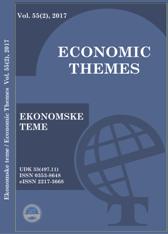Economic Themes (2017) 55 (2) 6, 243-262
Anton Vorina, Miro Simonič, Maria Vlasova
Abstract: This paper examines the relationship between employee engagement and job satisfaction. People spend most of their time at work, and their motivation is considered to be an important factor for job performance. Enthusiastic employees, who focus their efforts on achieving their companies’ goals are a key competitive advantage in the modern world. The effect of employee engagement on business performance has been studied by various experts. They found out the similar conclusion: “the more enthusiastic the workers are, the better operating results they achieve for the company”. An occasional sample of 594 respondents who are employed in the public and non-public sector in Slovenia was used for the purpose of this study. The main goal of the research is to determine whether (and how) the employee engagement influences job satisfaction. A written survey was conducted from 4 January 2016 to 14 March 2016. IBM SPSS 20 was used for the statistical analysis. The results confirm that the relationship between employee engagement and job satisfaction is positive and statistically significant (5 % significance level), based on the linear regression F (1, 583) =296.14, p-value = 0.000, R-square = 0.337. The results also show that there is no statistically significant difference between employee engagement and gender and there is no statistically significant difference between job satisfaction and gender.
Keywords: employee; engagement; job satisfaction; linear regression; factor analysis
AN ANALYSIS OF THE RELATIONSHIP BETWEEN JOB SATISFACTION AND EMPLOYEE ENGAGEMENT
Anton Vorina, Miro Simonič, Maria Vlasova
Abstract: This paper examines the relationship between employee engagement and job satisfaction. People spend most of their time at work, and their motivation is considered to be an important factor for job performance. Enthusiastic employees, who focus their efforts on achieving their companies’ goals are a key competitive advantage in the modern world. The effect of employee engagement on business performance has been studied by various experts. They found out the similar conclusion: “the more enthusiastic the workers are, the better operating results they achieve for the company”. An occasional sample of 594 respondents who are employed in the public and non-public sector in Slovenia was used for the purpose of this study. The main goal of the research is to determine whether (and how) the employee engagement influences job satisfaction. A written survey was conducted from 4 January 2016 to 14 March 2016. IBM SPSS 20 was used for the statistical analysis. The results confirm that the relationship between employee engagement and job satisfaction is positive and statistically significant (5 % significance level), based on the linear regression F (1, 583) =296.14, p-value = 0.000, R-square = 0.337. The results also show that there is no statistically significant difference between employee engagement and gender and there is no statistically significant difference between job satisfaction and gender.
Keywords: employee; engagement; job satisfaction; linear regression; factor analysis

